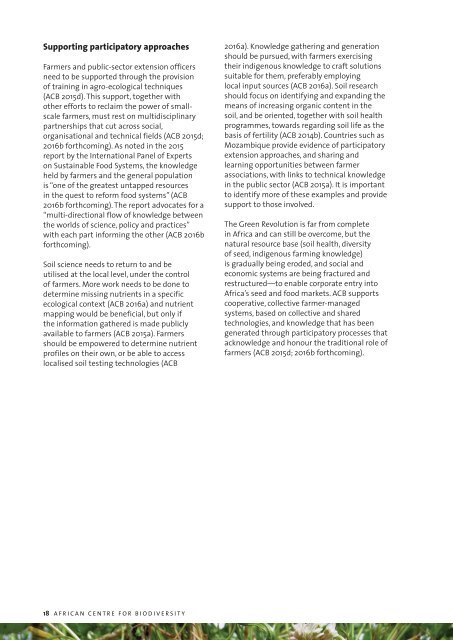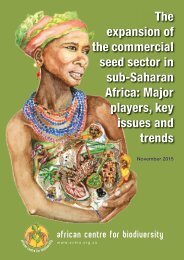SOIL FERTILITY
2aNyn6A
2aNyn6A
Create successful ePaper yourself
Turn your PDF publications into a flip-book with our unique Google optimized e-Paper software.
Supporting participatory approaches<br />
Farmers and public-sector extension officers<br />
need to be supported through the provision<br />
of training in agro-ecological techniques<br />
(ACB 2015d). This support, together with<br />
other efforts to reclaim the power of smallscale<br />
farmers, must rest on multidisciplinary<br />
partnerships that cut across social,<br />
organisational and technical fields (ACB 2015d;<br />
2016b forthcoming). As noted in the 2015<br />
report by the International Panel of Experts<br />
on Sustainable Food Systems, the knowledge<br />
held by farmers and the general population<br />
is “one of the greatest untapped resources<br />
in the quest to reform food systems” (ACB<br />
2016b forthcoming). The report advocates for a<br />
“multi-directional flow of knowledge between<br />
the worlds of science, policy and practices”<br />
with each part informing the other (ACB 2016b<br />
forthcoming).<br />
Soil science needs to return to and be<br />
utilised at the local level, under the control<br />
of farmers. More work needs to be done to<br />
determine missing nutrients in a specific<br />
ecological context (ACB 2016a) and nutrient<br />
mapping would be beneficial, but only if<br />
the information gathered is made publicly<br />
available to farmers (ACB 2015a). Farmers<br />
should be empowered to determine nutrient<br />
profiles on their own, or be able to access<br />
localised soil testing technologies (ACB<br />
2016a). Knowledge gathering and generation<br />
should be pursued, with farmers exercising<br />
their indigenous knowledge to craft solutions<br />
suitable for them, preferably employing<br />
local input sources (ACB 2016a). Soil research<br />
should focus on identifying and expanding the<br />
means of increasing organic content in the<br />
soil, and be oriented, together with soil health<br />
programmes, towards regarding soil life as the<br />
basis of fertility (ACB 2014b). Countries such as<br />
Mozambique provide evidence of participatory<br />
extension approaches, and sharing and<br />
learning opportunities between farmer<br />
associations, with links to technical knowledge<br />
in the public sector (ACB 2015a). It is important<br />
to identify more of these examples and provide<br />
support to those involved.<br />
The Green Revolution is far from complete<br />
in Africa and can still be overcome, but the<br />
natural resource base (soil health, diversity<br />
of seed, indigenous farming knowledge)<br />
is gradually being eroded, and social and<br />
economic systems are being fractured and<br />
restructured—to enable corporate entry into<br />
Africa’s seed and food markets. ACB supports<br />
cooperative, collective farmer-managed<br />
systems, based on collective and shared<br />
technologies, and knowledge that has been<br />
generated through participatory processes that<br />
acknowledge and honour the traditional role of<br />
farmers (ACB 2015d; 2016b forthcoming).<br />
18 AFRICAN CENTRE FOR BIODIVERSITY



